Remembrance and revival
Berlin is a city unafraid to reflect on its past. Alex Galbinski travels to the trendy German capital to sample its culture, art and Jewish history
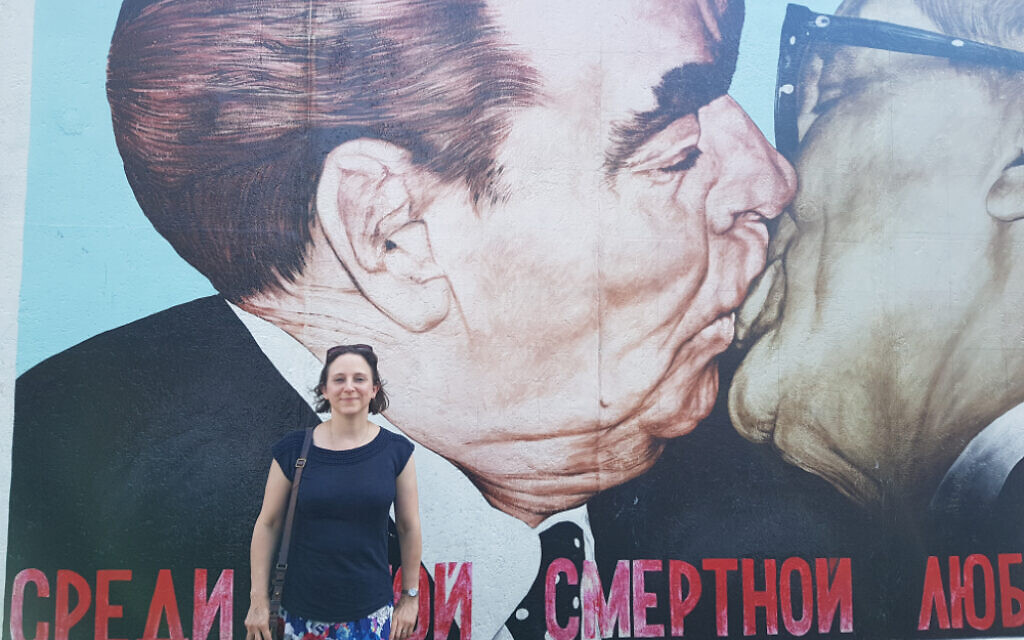
Standing in our boutique hotel in the trendy suburb of Kreuzberg, my friend and I admired its warm, burnt orange and chocolate interior.
We also noted the fractured windows of the Orania.Berlin’s art deco building – a result of an anti-gentrification protest held in the adjacent and buzzing Oranienplatz, not long after it opened in 2017.
But instead of replacing them, Orania.Berlin has retained them,
a testament to its commitment to becoming very much a part of
its surroundings, rather than rising above them.
Get The Jewish News Daily Edition by email and never miss our top stories Free Sign Up
The only five-star hotel in the area, the hallmark of Orania.Berlin is
its friendly staff and understated urban luxury. Its historic building
was commissioned in 1913 by Jewish merchant and city councillor
Leopold Jacobi.
Kreuzberg, one of the German capital’s eastern suburbs, is traditionally
the home of artists, who moved into the area because it was cheaper and edgier. A multicultural area with a large Turkish population, it has a real independent vibe – with chain-free shops and restaurants.
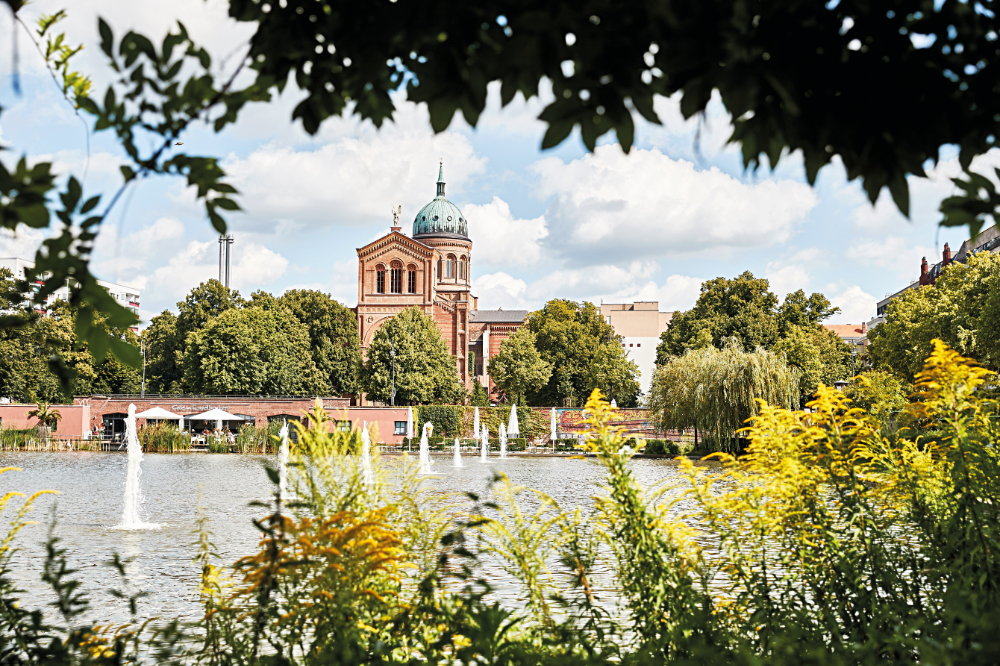
Yvonne, the friendly concierge, suggested we visit Berlin’s oldest residential quarter, Nikolaiviertel, at the heart of which is the striking, double-spired St Nicholas’ Church. The cobbled streets and small-style houses belie the historical reality of it having been bombed and rebuilt
in the late 1980s.
Our return to the hotel took us via the beautiful River Spree – on which you can take a scenic boat tour. Despite not speaking German, navigating the underground (U-Bahn) and bus network was straightforward.
Beautiful also in the day, Orania.Berlin becomes especially alive at night. Comfortable sofas and armchairs in the lounge area, with two open fires for extra cosiness, ensure you won’t want to leave. The salon – with its Steinway piano – hosts classical, jazz and world music concerts, film screenings and talks. There is also a gym – but you’re unlikely to make time to go.
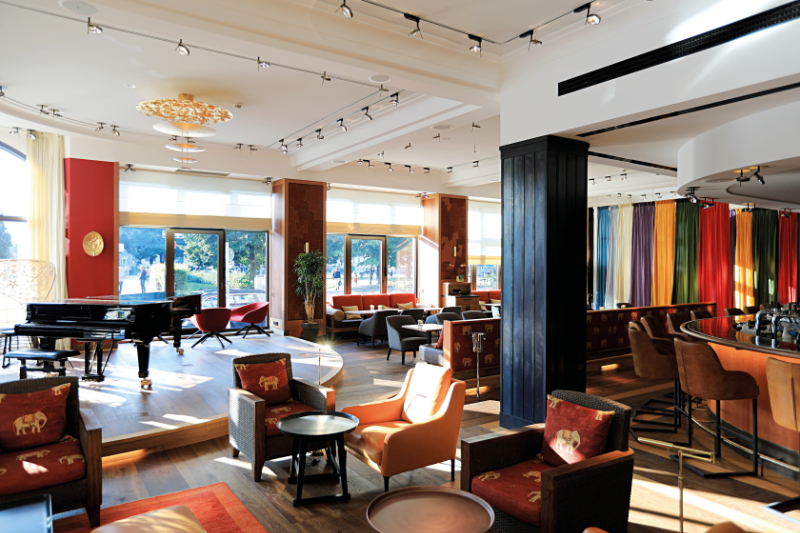
With only 41 rooms and suites, the hotel feels intimate. But it’s also spacious; my friend and I shared a roomy junior suite, the windows
of which were tall and airy and overlooked the square, with an equally generous bathroom. As throughout the hotel, Asian-inspired red furnishings featured elephant motifs and the food served in the
restaurant is inventive and delicious.
Unlike other cities, Berlin has confronted its past and has many monuments attesting to Jewish life – and persecution.
Jews are recorded as having lived in the city since the 13th century,
and they have been instrumental in its cultural and economic life.
By the 1920s, there were around 170,000 Jews in the city, the largest
Jewish population in Germany, most of whom – including the wife of the now deceased Jacobi – were forced to flee the country after Adolf Hitler was elected Chancellor in 1933. Some 55,000 Berlin Jews were murdered
in the Holocaust.
We visited the Daniel Libeskind-designed Jewish Museum, a stark
building with a titanium-zinc façade and concrete voids that felt oppressive and eerie.
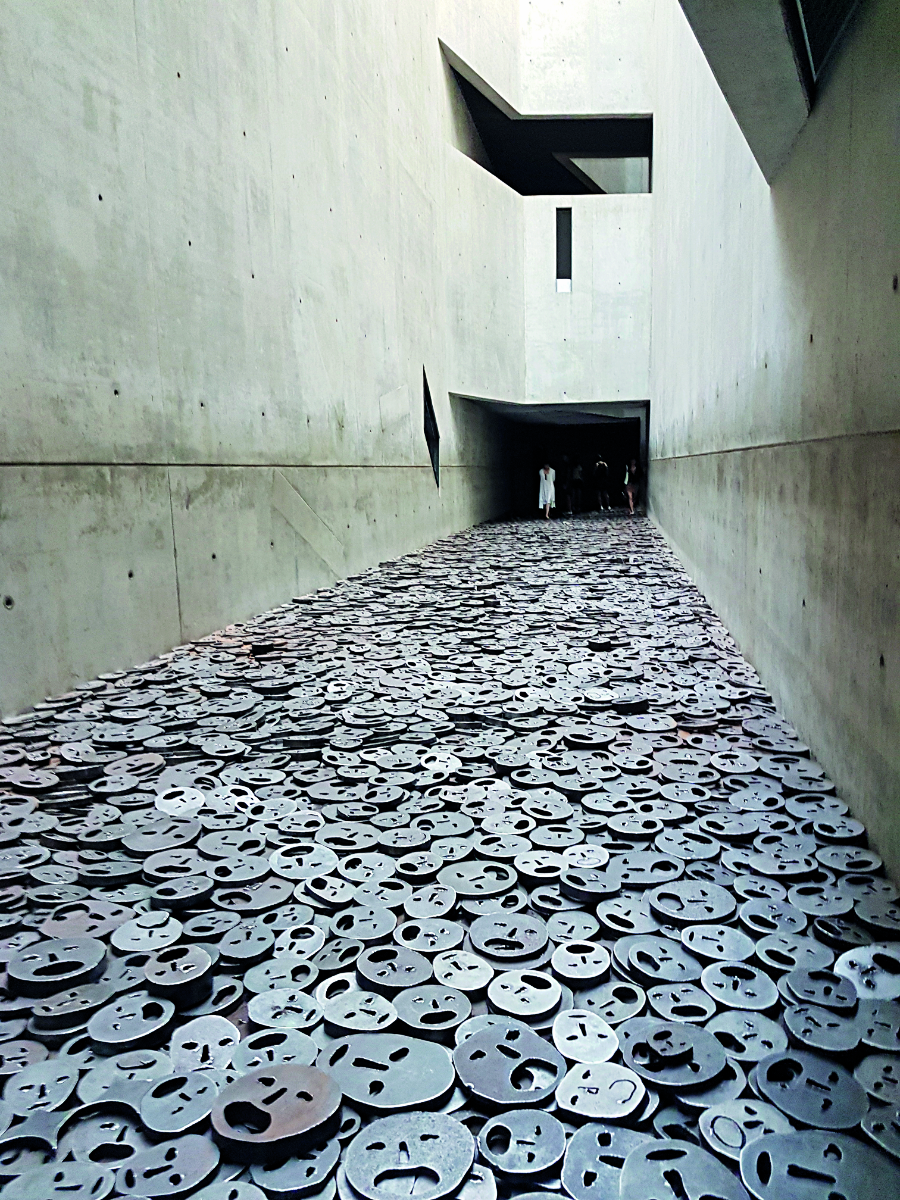
The permanent exhibition is currently being modernised, but we were able to see the Fallen Leaves installation by Menashe Kadishman. Covering the ground floor void are more than 10,000 faces cut from heavy round iron plates, which some feel disconcerting to walk over.
Exhibits from the Nazi era tell of personal stories related to exclusion and forced emigration as well as – obviously – death, but the A Is for Jewish: Journeys through Now in
22 Letters was more uplifting and featured surprising explorations about what it means to be Jewish in Germany today.
The Jewish community in Berlin is one of the fastest growing in the country. While antisemitism has certainly not been eradicated, there
are now reported to be more than 30,000 Jews in the city, including thousands of Israelis, some of whom have opened restaurants showcasing their cuisine.
We walked through some of the 2,711 grey concrete slabs that make up
the Memorial to the Murdered Jews of Europe. The stones – of different heights – are imposing and disorientating, and are a stark memorial directly in the centre of the city, near the Brandenburg Gate, while the underground information centre provides context to the victims and
their history.
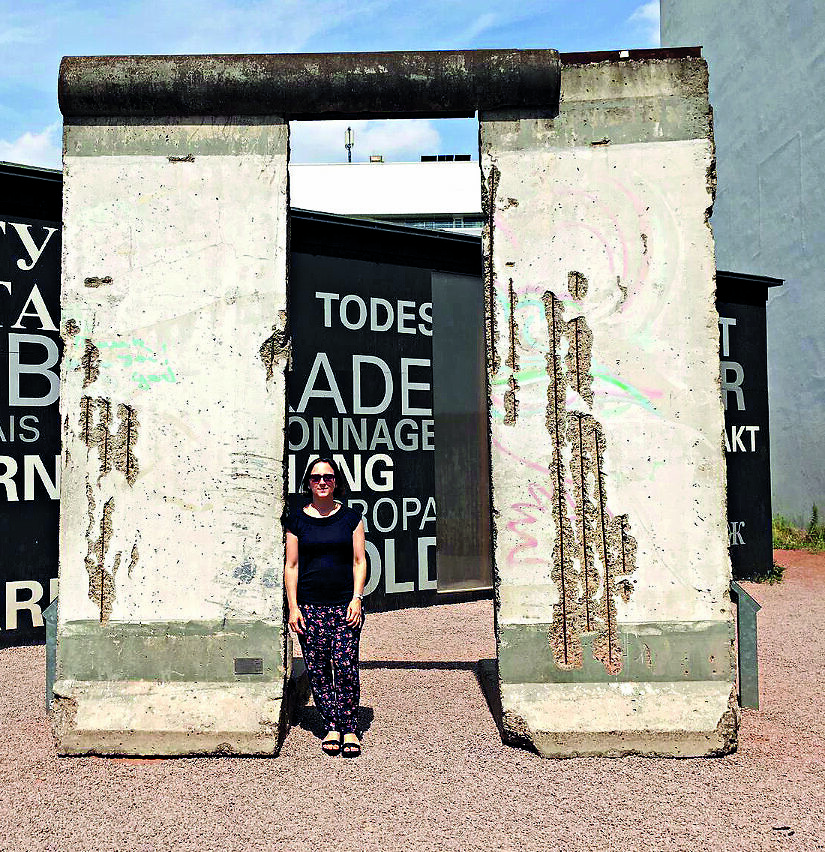
A visit to Berlin is not complete without an appreciation of its communist past, and nowhere is
this more poignant than standing
at Checkpoint Charlie, the most
infamous crossing point between the communist East and the Allied West. The stories of those who tried,
or managed, to flee are told in
the Mauermuseum.
Sections of the Berlin Wall – built in 1961 and demolished in 1989 as communism collapsed – are able to be seen in various parts of the city.
After a leisurely lunch at the Asia Street Kitchen Festival, held at Kreuzberg’s hip beer garden venue Birgit & Bier, we spent a good couple
of hours tracing the steps of what was once the Wall and is now the
1.3km East Side Gallery, the world’s largest open-air gallery displaying many iconic murals.
We barely scratched the surface of things to see and do in Berlin, but
we made a good start. Whether culture, history, eating and drinking or shopping is your bag, this city has it all.
Travel tips
Orania.Berlin is available from €270 (£228) per night, based on two adults sharing an Orania.25 room and including breakfast and tickets to all concerts at the hotel. https://orania.berlin
The Berlin Welcome Card (www.berlin-welcomecard.de/en) costs
€23 (£19) for 48 hours and gives free entry to 30 attractions as well
as discounts. For tourist information, see www.visitberlin.de

Thank you for helping to make Jewish News the leading source of news and opinion for the UK Jewish community. Today we're asking for your invaluable help to continue putting our community first in everything we do.
For as little as £5 a month you can help sustain the vital work we do in celebrating and standing up for Jewish life in Britain.
Jewish News holds our community together and keeps us connected. Like a synagogue, it’s where people turn to feel part of something bigger. It also proudly shows the rest of Britain the vibrancy and rich culture of modern Jewish life.
You can make a quick and easy one-off or monthly contribution of £5, £10, £20 or any other sum you’re comfortable with.
100% of your donation will help us continue celebrating our community, in all its dynamic diversity...
Engaging
Being a community platform means so much more than producing a newspaper and website. One of our proudest roles is media partnering with our invaluable charities to amplify the outstanding work they do to help us all.
Celebrating
There’s no shortage of oys in the world but Jewish News takes every opportunity to celebrate the joys too, through projects like Night of Heroes, 40 Under 40 and other compelling countdowns that make the community kvell with pride.
Pioneering
In the first collaboration between media outlets from different faiths, Jewish News worked with British Muslim TV and Church Times to produce a list of young activists leading the way on interfaith understanding.
Campaigning
Royal Mail issued a stamp honouring Holocaust hero Sir Nicholas Winton after a Jewish News campaign attracted more than 100,000 backers. Jewish Newsalso produces special editions of the paper highlighting pressing issues including mental health and Holocaust remembrance.
Easy access
In an age when news is readily accessible, Jewish News provides high-quality content free online and offline, removing any financial barriers to connecting people.
Voice of our community to wider society
The Jewish News team regularly appears on TV, radio and on the pages of the national press to comment on stories about the Jewish community. Easy access to the paper on the streets of London also means Jewish News provides an invaluable window into the community for the country at large.
We hope you agree all this is worth preserving.
-
By Brigit Grant
-
By Laurent Vaughan - Senior Associate (Bishop & Sewell Solicitors)
-
By Laurent Vaughan - Senior Associate (Bishop & Sewell Solicitors)
-
By Laurent Vaughan - Senior Associate (Bishop & Sewell Solicitors)
-
By Laurent Vaughan - Senior Associate (Bishop & Sewell Solicitors)





















